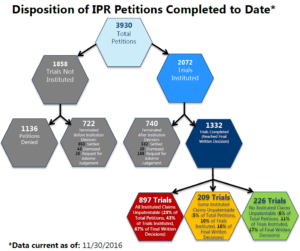
Inter Partes Review Challenged at the Supreme Court
The old adage in patent law has always been that “patents are presumed valid.” This gives patent owners and industry confidence as to the ownership of technology. However, in recent years, the prevalence of inter partes reviews (IPR) has put the adage in doubt. The Supreme Court may add certainty back to this presumption as it recently agreed to hear a case challenging the validity of IPRs.
For the uninitiated, an IPR is a mechanism that allows third parties to challenge the validity of an issued US patent in a procedure conducted by the Patent Trial and Appeals Board of the US Patent and Trademark Office (USPTO). IPRs were introduced in 2012 with the America Invents Act with the goal of reviewing poorly examined patents and helping end misuse of patents. IPRs quickly became a popular tool for defendants in patent infringement law suits to the point of becoming an assumed defensive strategy in patent litigation. Once an IPR petition is received, the USPTO first decides whether or not to “institute” an IPR trial. After the trial, the USPTO makes a “final written decision,” potentially invalidating the claims of the patent.
From 2012 through  November 2016 there have been 3,930 IPR petitions. The USPTO institutes a trial in about 65% of petitions, excluding settlements and other dismissals. When reaching its final written decision, the USPTO finds all of a challenged patent’s claims unpatentable 67% of the time and finds at least one of a challenged patent’s claims unpatentable 16% of the time (once again excluding settlements and other dismissals). Overall, the USPTO cancels all claims or alters a patent in 44% of petitions not settled or dismissed. This accounts for 28% of all petitions. While there is evidence of a trend giving patent owners more success than in the early years of IPRs, the success rate of challenged patents is unnerving to many.
November 2016 there have been 3,930 IPR petitions. The USPTO institutes a trial in about 65% of petitions, excluding settlements and other dismissals. When reaching its final written decision, the USPTO finds all of a challenged patent’s claims unpatentable 67% of the time and finds at least one of a challenged patent’s claims unpatentable 16% of the time (once again excluding settlements and other dismissals). Overall, the USPTO cancels all claims or alters a patent in 44% of petitions not settled or dismissed. This accounts for 28% of all petitions. While there is evidence of a trend giving patent owners more success than in the early years of IPRs, the success rate of challenged patents is unnerving to many.
Many commentators have asked if the USPTO, an executive branch government agency, is the correct venue to challenge a patent. This question will be answered in Oil States Energy Services LLC v. Greene’s Energy Group LLC, as the Supreme Court has recently granted certiorari on the matter. Oil States maintains that patents are private property rights and should be challenged in an Article III judicial branch court, making IPRs unconstitutional. Greene Energy supports the lower court ruling, where the Federal Circuit maintains that patents are public rights, and as such, IPRs are properly held within the USPTO.
Many patent owners that rely on the presumption of validity are hoping for a reprieve from the onslaught of IPRs. On the other hand, IPRs have successfully been used to combat poorly examined patents. In either case, the strength of the presumption of validity of patents will likely become clear.
